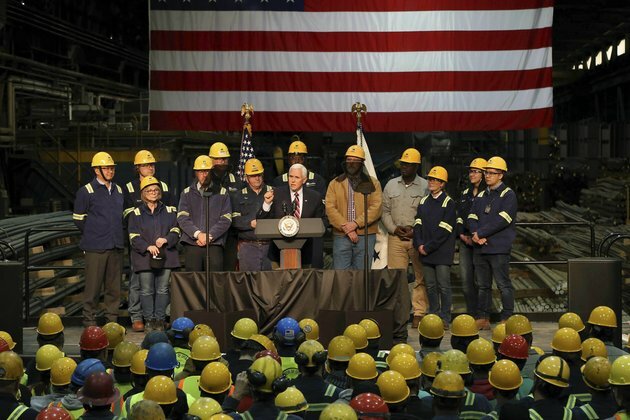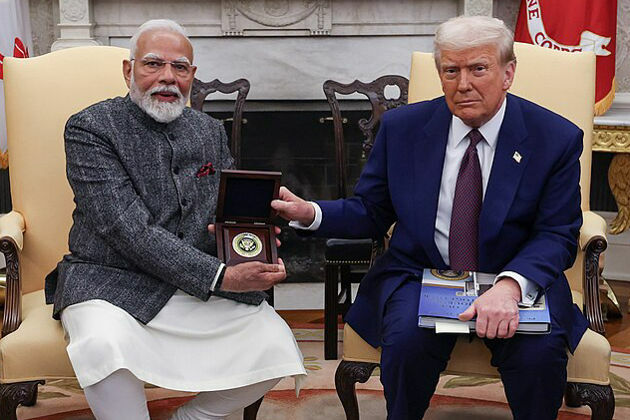Is Trump's trade war saving American jobs ? or killing them?
The Conversation
16 May 2019, 07:56 GMT+10

With the U.S.-China trade war intensifying, there is a lot of talk about whether tariffs save American jobs - as President Donald Trump claims - or destroy them.
On May 14, for example, Trump said his tariffs helped save the U.S. steel industry. Whether or not that's true, many economists and industry organizations argue trade protectionism is actually hurting workers in a range of other areas, such as the solar power sector, civil aircraft and auto manufacturing.
So is the trade war making Americans better off or worse? Political economists like me have been exploring this question since Trump's trade war began about a year ago. The answer makes a big difference to the economic welfare of American workers. And, with the 2020 elections soon approaching, it may help determine whether Trump is able to remain in the Oval Office.
The winners
At first glance, the jobs data does look good for Trump's argument.
Since Trump announced tariffs on more than 1,000 Chinese products on April 3, 2018, about 2.6 million new jobs have been added to the U.S. economy.
This includes 204,000 jobs in manufacturing, the sector of the economy that hemorrhaged over 5 million positions from 2000 to 2009, a problem blamed on free trade and China.
The good news for Trump doesn't stop there. Some of the biggest gainers over the last year are industries like fabricated metals, machinery and electronic instruments, all of which saw gains of 15,000 to almost 30,000 jobs over the past year. All those industries enjoy at least some protection from Trump's tariffs.
Those numbers seem to support Trump's rhetoric that tariffs are providing a vital shot in the arm of America's ailing manufacturing sector. And they may even show why the U.S. economy continues to hum despite economist fears that a trade war would hurt growth.
The losers
Unfortunately, not all industries are enjoying the same success.
Of the 20 major manufacturing categories in the latest Bureau of Labor Statistics data, only six have grown faster during the trade war - which arguably began with the threat of widespread tariff increases in April of 2018 - than in previous years. The rest, which include chemicals, paper and textiles, either didn't enjoy a boost or lost ground during the period.
And here is one lesson from the trade war. If Trump and his supporters want to claim that tariffs helped accelerate job creation in machinery and metals, then it follows that his policies should share some of the blame for the less encouraging performance of other sectors hurt by retaliation from other countries.
After Trump extended steel tariffs to the European Union, the EU hit America's textiles industry. Canada targeted some paper products in retaliation for tariffs on steel and softwood lumber. And China, Trump's primary antagonist, hit chemicals along with a large swath of other industries - with further retaliation on the way.
Beyond jobs
Nonetheless, the simple fact remains: The U.S. economy continues to add more jobs.
But this is only one part of the equation for how tariffs are affecting working Americans and their quality of life. What about wages, which account for 70% of an employee's average compensation?
There's less good news for Trump in this data.
The annual growth in seasonally adjusted hourly pay during the trade war averages out to around 3.2% across all private sector U.S. employees.
There are two important things to say about that 3.2%. First, it falls short of pre-Great Recession levels, when wage growth was typically a full point higher. Second, wage growth in manufacturing - the sector Trump has lavished the most attention on - actually lags behind the national average at just 2.3%.
Those wage numbers are good reason to hold our applause for Trump's tariffs. Protected industries are adding jobs, but wages aren't living up to expectations.
Looking for good news
The competing job numbers explain why the debate over Trump's tariffs are full of confusing anecdotes - and why most anyone can find "good news" to support their favorite argument.
Americans have heard United Steel Workers thank Trump for helping bring over 1,000 jobs back to Birmingham, Alabama. They've also heard General Motors announce that it lost US$1 billion in 2018, partly because tariffs contributed to rising production costs, and that as many as 14,000 jobs are being cut.
A fuller picture of how well workers are doing requires looking beyond the jobs numbers at how much money they're actually taking home - and how it's affecting their living standards.
And none of this says anything about another crucial part of the equation: consumer prices. If the latest data from Goldman Sachs is on the money, things are about to get a whole lot worse for working-class Americans as the price tags attached to products affected by the trade war begin to rocket upward.
This is hardly good news for the average household.
 Share
Share
 Tweet
Tweet
 Share
Share
 Flip
Flip
 Email
Email
Watch latest videos
Subscribe and Follow
Get a daily dose of China National News news through our daily email, its complimentary and keeps you fully up to date with world and business news as well.
News RELEASES
Publish news of your business, community or sports group, personnel appointments, major event and more by submitting a news release to China National News.
More InformationBusiness
SectionEngine defect prompts Nissan to recall over 443,000 vehicles
FRANKLIN, Tennessee: Hundreds of thousands of Nissan and Infiniti vehicles are being recalled across the United States due to a potential...
Microsoft trims jobs to manage soaring AI infrastructure costs
REDMOND, Washington: Microsoft is the latest tech giant to announce significant job cuts, as the financial strain of building next-generation...
Stocks worldwide struggle to make ground Friday with Wall Street closed
LONDON UK - U.S. stock markets were closed on Friday for Independence Day. Global Forex Markets Wrap Up Friday with Greeback Comeback...
Nvidia briefly tops Apple’s record in AI-fueled stock rally
SANTA CLARA, California: Nvidia came within a whisker of making financial history on July 3, briefly surpassing Apple's all-time market...
ICE raids leave crops rotting in California, farmers fear collapse
SACRAMENTO, California: California's multibillion-dollar farms are facing a growing crisis—not from drought or pests, but from a sudden...
Trump signals progress on India Trade, criticizes Japan stance
WASHINGTON, D.C.: President Donald Trump says the United States could soon reach a trade deal with India. He believes this deal would...
Asia Pacific
SectionTrump signals progress on India Trade, criticizes Japan stance
WASHINGTON, D.C.: President Donald Trump says the United States could soon reach a trade deal with India. He believes this deal would...
Dalai Lama to address Buddhist conference, reveal succession plan
DHARAMSHALA, India: The Dalai Lama is set to address a significant three-day conference of Buddhist leaders this week, coinciding with...
Beijing crowds cheer AI-powered robots over real soccer players
BEIJING, China: China's national soccer team may struggle to stir excitement, but its humanoid robots are drawing cheers — and not...
COVID-19 source still unknown, says WHO panel
]LONDON, U.K.: A World Health Organization (WHO) expert group investigating the origins of the COVID-19 pandemic released its final...
UN Demands End to Myanmar Violence as Junta’s Election Plans Risk Further Instability
Nearly three months after a devastating earthquake struck Myanmar, the country remains trapped in a deepening crisis, compounded by...
Fresh IVF error raises alarm over clinic safety and oversight
MELBOURNE, Australia: A second embryo mix-up in just two months has pushed one of Australia's largest IVF providers back into the spotlight,...













